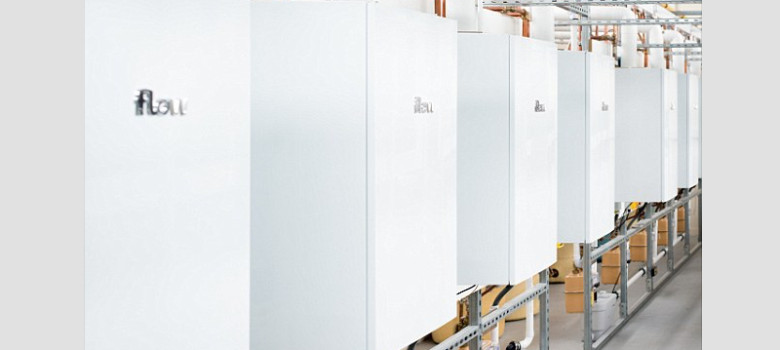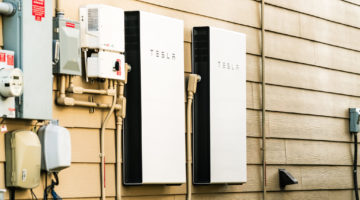
UPDATE: The Feed-In Tariff is now closed for new applications. To find out about the new scheme designed to replace it, click here.
Earlier this year a new domestic boiler was introduced onto the market that produces hot water as well as electricity that can be used in the home to power lights and appliances.
The Flow boiler is a type of CHP boiler – where CHP stands for combined heat and power. Up to now, CHP boilers have been used to great effect in commercial heating situations as well as multi-dwelling properties but this is the first time a company have tried to crack the domestic CHP market aside from a very brief foray into the market by Baxi in 2011.
Here we want to put Flow’s CHP offering under the spotlight, however we want to make it quite clear before we start, we haven’t installed one of these boilers in our homes, this is purely based on the figures available on their website and general trends in the CHP market.
The Flow CHP Boiler offers
So the Flow has two offerings – the first is the Flow Freedom offer
Flow Freedom involves paying £3,675 upfront for your new boiler (inclusive of VAT). You need to pay installation on top of this and the figure they state on their site is £1,800 but obviously this varies from house to house. Obviously if there is a lot of pipework to change then this number could escalate very quickly, but likewise if it is a relatively simple install then the install price could be lower.
Under this offer, you are required to sign up to Flow’s energy tariff, which is actually very competitively priced (e.g. 10/11 p/kWh of electricity and 3/3.5p/kWh of gas depending where in the country you are).
You are required to pay for all the gas you use (as you might expect!) but also all the electricity – you can’t use the free electricity you produce – or at least you can but you have to pay for it!
You are also required to sign over your Feed-in tariff payments to Flow for the 5 years of the offer.
In return, flow will give you a payment each month of £80 – so a total of £4,800 over the 5 years.
After the 5 years, you then can benefit from the FIT which get reassigned to you – this means you get paid 13.24p for every unit (kWh) of electricity you produce.
Getting a Flow Boiler without any upfront payments
The second offer is Flow Finance.
Like the name infers, this allows you to get the boiler on finance so there are no upfront costs. The finance costs £75.50 per month for 5 years – so the total payment is £4529.89 – this however does not include the cost of install, which in some cases can be added to the loan too.
Aside from that – the offer is the same as Flow Freedom, you need to take their energy tariff, you need to pay for all gas and electricity you use in the home and you need to assign the FIT over to Flow.
In return you will receive £80 reductions on your home energy bill every month for 5 years – totalling £4,800.
 Do the numbers stack up?
Do the numbers stack up?
Lets compare the Flow Freedom offer with a normal boiler install – we have picked a £900 Worcester Greenstar heat only boiler from Plumbnation (Inc VAT).
Install wise we have spoken to a variety of our partners and have come out at an install price of £900 (inclusive of VAT) including the installer margin. We have had one installer who will put this on the wall for just £600 though!
Therefore for this normal boiler install we are looking at a price of £1,800 inclusive of VAT.
Under the Flow Freedom offer, the cost of the boiler + install (based on their estimated prices) would be £5,475 inclusive of VAT so about £3,675 more.
For a regular boiler though you need to pay for all the gas you use and you wouldn’t get any rebate from the installer unless they were feeling particularly generous.
Under Flows offer you would get back £4,800 over the 5 years so the final cost to you would be £5,475 less that – so just £675.
On these numbers alone, it certainly stacks up – especially when you take into account the Feed in tariff payments that would be due after the 5 year ‘contract’ with Flow was up. However there is obviously the cash you need to find upfront!
How much could the remaining FIT be worth to a household?
This question is a little bit like how long is a piece of string to be honest, because it entirely depends on the amount of electricity produced by the system.
The boiler when it is running will generate 1kW of power, so if you generate a unit of electricity with it you are going to get paid 13.24 pence regardless of what happens with that electricity.
If you use the electricity in your home then you make a saving of about the same for each unit produced (10-15p / kWh) since you don’t need to buy it from the grid.
You could export the electricity at 4.77p/kWh, but obviously the energy saving is far better!
If the boiler was on for 1500 hours per year (1200 hours during the winter months for heating and remainder just for hot water) then you would get paid just shy of £200 each year for the remaining 15 years of the tariff (remember Flow take the first 5 years worth of tariff)
This doesn’t take into account the energy savings if you manage to use the electricity – which could take the savings to £400 a year.
So again the numbers work here!
So what is the downside of the Flow boiler?
Firstly the current Flow boiler is an 18kW-condensing boiler that will heat a 3-5 bedroom house depending on heat demand. It also currently requires a separate hot water tank (like a heat only boiler), therefore if you live in a small house where space is a premium it may not be for you. Likewise if you have a combi boiler already, then you will need to install a new hot water tank, which might be an inconvenience. Flow are working on both a combi version (without hot water tank) as well as larger units to heat bigger properties.
The major flaw with CHP heating is that you can only produce electricity while the boiler is producing hot water so in domestic settings when the boiler is only on for an hour or so during the summer months to produce hot water for washing, the amount of electricity that will be produced is actually very small. Likewise there is no battery storage element to the flow so unless your boiler is on when you want to use the electricity it is likely going to get exported. However since you can program the boiler when to turn on the hot water and heating, it shouldn’t be difficult to set this at a time when you are home in the evening.
Another issue is that since the Flow boilers are doubling as electricity generators, they will consume slightly more gas than a modern boiler when they are operating, and will increase the annual gas bill by about £40.
The final issue and perhaps the most serious one is that CHP is a relatively unknown technology. Despite the fact the boiler was in development for over 10 years, the flow boiler only comes with a 2 year manufacturer’s warranty (although if you stay with flow energy this will be extended to 10 years).
This for us is the biggest issue, one can very easily go and buy a new boiler with a 7 year + warranty – so why take the risk! Why haven’t any of the boiler big boys (e.g. Vailliant, Worcester Bosch) taken the jump into domestic CHP – their lack of activity could in fact be the most telling!
UPDATE: The Feed-In Tariff is now closed for new applications. To find out about the new scheme designed to replace it, click here.
Installing a new boiler
Are you thinking about getting a new boiler? We have scoured the country for the best tradespeople, so that we can make sure we only recommend those we really trust.
If you would like us to find you a local installer to install a new boiler in your home, just fill in the form below and we will be in touch shortly!












The is a fantastic guide on the flow boilers. We looked at one and I actually agree. It was the unknowns on the chp technology that made us stick with a conventional one. The price actually isn’t too bad for them.
Hi, we tend to agree. I think the time for the flow boiler will certainly come, but at the moment with boiler manufacturers offering up to 10 year warranties on conventional boilers, it seems looking much beyond them seems a bit silly! The flow CHP boiler will certainly have it’s time in the sun though especially if time of use tariffs come into play, and one can export electricity at peak times and actually make money from having the heating switched on. It seems a distant pipedream at the minute, but actually this could be a reality in the next 5 or so years!
Unfortunately Flow downgraded their sales expectations for 2015 from 20,000 to 500! None of these have yet been installed, it would seem. As a result their share price halved, as you might expect. Even the Flow boiler which has the lowest electrical efficiency of any CHP boiler is fairly expensive and with just 500 being sold in 2015, this is unlikely to change in the near future. A range of options will be available over the next 18 months with higher electrical efficiencies, so choose carefully if you’re interested.
Hi Paddy, I think the issue is reputation. Most people we come across have heard of the likes of Valliant or Worcester bosch. The flow boiler is a huge outlay (I appreciate much of the cost is recovered) but on essentially an unknown brand.
Last time I looked the gas and electric bits were covered for different time scales gas for two electric for five which could lead to complications No mention in there blerb about the extra gas consumption,and does the guarantee cover the cost of the once a year service which will probably cost more ,did not know about the extra tank as well.how much water does it store because need to look at reheat time .You will only get your rebate for 5years as long as the company is still going presumably,
Does the amount of electricity produced vary with the temperature of the water? If so, what temperature does the water have to be to generate electricity at the full rating of the generator? Or preferably send me a graph of kilowatts against temperature.
Thank you.
I think the estimate of £40 extra per annum on the gas bill must be wrong. A rough calculation suggests to me it might be more like £70 allowing for inefficiencies in the generator.
Hi David, that may well be the case! We seem to be getting a lot of interest in the flow boiler, but I think at present people are a little concerned whether they are going to last compared to a new conventional boiler. Any thoughts?
I looked into the Baxi microCHP in 2011. They adopted the Sterling technology. This was unsuited to short run domestic profiles, though superb for long running profiles such as hospitals etc. The Rankine technology is better suited to the domestic profile. That the big boys haven’t adopted new technology is because their profit profile is still excellent, and they don’t wish to disturb it. All their targets are very narrow. Their incentives, structures and management focus don’t encourage new technology adoption. Narrow minded yes, currently profitable yes too. A big however is look at every vacuum cleaner manufacturer’s dismissal of Dyson. Look at GM’s crushing of EV1 and their subsequent filing for Chapter 11 Bankruptcy. IBM’s classic dismissal of PC technology. The list is endless. Go for it.
Find this very interesting as in the near-ish future I will be looking to convert the two one-floor flats I have into a two-floor duplex.
My idea has been to use underfloor electric heating on one floor (the colder basement level) , and radiators on the (easy to keep warm) first floor.
Do you know if the output figures of the Flow boiler make this a viable balance where most of one floor’s heating would be free (after the FIT returns to me) while the other floor is being heated?
A while ago I had been watching CERES with interest as they were seemingly going to develop a great household CHP, but they seem to have become a non-starter now.
Thank you in advance
Alex
I find your estimate for normal boiler installation low. British gas and independant local installers have quoted c. 3k for the job (Worcester Greenstar). The house is 4 bed, nothing unusual and presently has a old combi boiler. Friends who have had new combis fitted have paid similar prices e.g around 3k.
Further, didn’t those Baxi CHP boilers have a reliability problem and were relatively complex to instal, I wonder if the flow boilers are any different ? Who makes them?
Hi Paul, the prices we give are only as a guide – I know that the price varies between installers significantly. In terms of the reliability issues, that is what scared me off too. I think you are absolutely right – why would you risk an unproven technology (or at least one that hasn’t established itself yet in the market) when you can get a Worcester Bosch or Vaillant boiler that comes with a 10 year warranty and you know will do the job!
I think things will change when the export tariff (the amount you get paid for exporting the electricity you produce) becomes variable, so you get paid different amounts at different times of the day – mainly because the Government will use this to try and stifle demand (i.e. they will charge more for electricity at peak times to lower demand, so if you are selling the electricity you will get paid more). This would be the game changer for CHP – but I think until the smart meter roll out takes place this would never work.